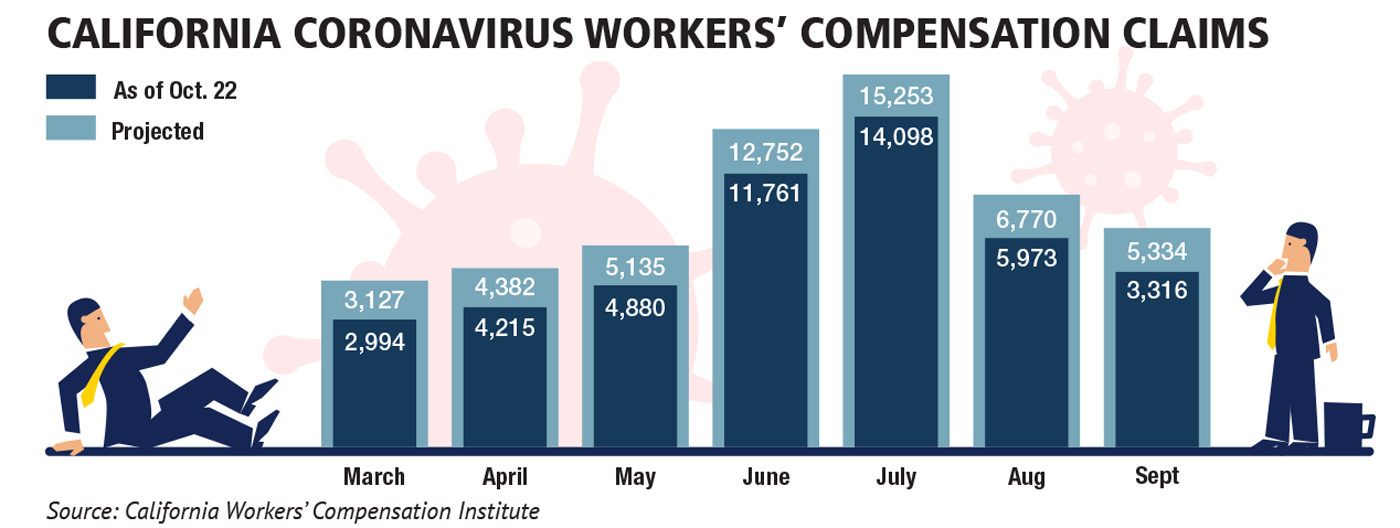
While the number of COVID-19 workers’ comp cases filed in California continues to grow, total workplace injury and illness claims in the state have fallen nearly 20% so far in 2020 compared to 2019. Through September, the state had recorded 47,412 COVID-19 workers’ compensation claims, accounting for 11.1% of all claims reported since the start of the year. During that same period, California workers filed 425,280 workers’ compensation claims, down 19% from the first nine months of 2019.
COVID-19 case numbers
The first COVID-19 cases among California workers were filed in March. They peaked in July and started to decline in August just when parts of the state started opening up on a partial basis. Numbers have continued to fall, as you can see at a glimpse of claims counts as of Oct. 21:
- March: 2,994 (ultimate projected cases for the month: 3,127).
- April: 4,215 (ultimate projected: 4,382).
- May: 4,880 (ultimate projected: 5,135).
- June: 11,761 (ultimate projected: 12,752).
- July: 14,098 (ultimate projected: 15,253).
- August: 5,973 (ultimate projected: 6,770).
- September: 3,316 (ultimate projected: 5,334).
While it’s too early to tell if it’s a harbinger of things to come, the numbers are high enough that employers cannot let their guard down when it comes to preventing the spread of the coronavirus in their workplaces.
Who is filing claims?
The top five sectors reporting COVID-19 workers’ compensation claims during the first seven months of the year were:
- Health care workers: 16,889 claims (37% of all claims)
- Public safety/government workers: 6,902 claims (15%)
- Manufacturing: 3,759 claims (8.3%)
- Retail workers: 3,593 claims (7.9%)
- Transportation: 2,255 claims (5%).
Overall claims falling
Due to the severe economic slowdown brought on by the coronavirus pandemic that forced thousands of businesses to shut their doors or have their employees work from home, the number of overall workplace injuries has tumbled.
There were 425,280 workers’ compensation claims filed in California in the first nine months of the year, compared to 526,469 claims in the same period of 2019. That’s a drop of 19.2%. The case load in September dropped 30% compared to September 2019.
“That decline reflects both the sharp drop in employment, the high number of workers now working from home, and the pandemic-driven slowdown in economic activity in the state,” the California Workers’ Compensation Institute wrote in a report about the numbers.
Handling workers’ comp claims
A new law that took effect in September extends workers’ compensation benefits to California employees who contract COVID-19 while working outside of their homes.
To qualify for the presumption, all of the following conditions must be met:
- The worker must test positive for or be diagnosed with COVID-19 within 14 days after a day they worked at your jobsite at your direction.
- The day they worked at your jobsite was on or after June 6.
- The jobsite is not their home or residence.
- If your worker is diagnosed with COVID-19, the diagnosis was done by a medical doctor and confirmed by a positive test for COVID-19 within 30 days of the date of the diagnosis.
The takeaway
If you have an employee who is working on-site and who tests positive for COVID-19, you should let them know about their rights to file for workers’ compensation if they miss work and/or need treatment.
The state’s insurance commissioner has approved new rules that bar insurers from using any COVID-19 claims against your experience modifier (X-Mod), so it won’t hurt your workers’ comp experience if an employee files a claim.